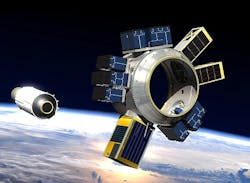Officials of the Air Force Space and Missile Systems Center at Peterson Air Force Base, Colo., announced a $43.9 million contract this week to L3 National Security Solutions (NSS) for the AFSCN contract. CACI completed its $550 million acquisition of L3 NSS in February.
CACI will provide continued operations and maintenance at eight AFSCN mission locations throughout the world, as well as AFSCN factory compatibility testing, and phase-in sustainment activities for the same systems, Air Force officials say.
The AFSCN is a critical operational national resource used to deploy and operate national security space systems. It provides globally distributed telemetry, tracking, and commanding support for pre-launch, deployment, and on orbit anomaly resolution and disposal operations.
The AFSCN provides support for the operation, control, and maintenance of U.S. civil and military satellites, including telemetry, tracking, and commanding operations.
Related: Honeywell to upgrade antenna electronics for Air Force satellite-control station
The AFSCN also provides prelaunch checkout and simulation, launch support, and early orbit support while satellites are in initial or transfer orbits and require maneuvering to their final orbit.
The AFSCN provides tracking data to help maintain the catalog of space objects and distributes various data such as satellite ephemeris, almanacs, and other information.
The AFSCN satellite operations centers are manned around the clock and are responsible for command and control of their assigned satellites. Each antenna at a remote tracking station is called a side.
On this contract CACI personnel will do the work at Diego Garcia, British Indian Ocean Territory; the U.S. Territory of Guam; Ka'ena Point, Hawaii; New Boston Air Force Station, N.H.; Thule Air Force Base, Greenland; Vandenberg Air Force Base, Calif.; Bordon, Hants, United Kingdom; and Cape Canaveral Air Force Station, Fla., and should be finished by December 2023.
For more information contact CACI International online at www.caci.com, or the Air Force Space and Missile Systems Center at www.losangeles.af.mil/Units.



